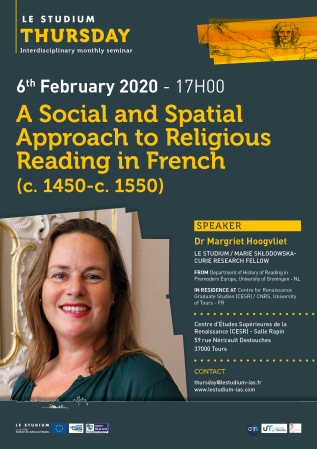A Social and Spatial Approach to Religious Reading in French (c. 1450-c. 1550)
Centre d’Études Supérieures de la Renaissance (CESR) - Salle Rapin
59 rue Néricault Destouches
37000 Tours
France
Presentation
Were ordinary French townspeople illiterate and without any knowledge of religious matters in the premodern period, just before the Reformation? And was France even then an exception when compared to the surrounding European regions? My research shows that up to ca. 1550 many of the inhabitants of “average” French towns as Tours and Orléans were literate and that they did have access to religious texts in French. Centuries-old documents from the historical archives, as well as surviving handwritten books and early prints have provided information about the wide range of social backgrounds of the readers, from a stocking maker in Orléans to well-off merchants and lawyers. Furthermore, I also analyse religious reading activities by lay people in Tours and Orléans from a spatial perspective: Reading, books, and libraries will also be studied as places of knowledge (lieux de savoir), where knowledge was created, stored, accessed, or disseminated. The historical data often allow plotting these places of knowledge on historical maps of premodern Tours and Orléans. Further analysis of these places of knowledge by making use of GIS will allow for even more refined conclusions about concentrations and accessibility. The final results of the research will enable to show that religious reading by the laity in premodern France had many characteristics in common with other European areas.
Speaker
Dr Margriet Hoogvliet,
LE STUDIUM / Marie Skłodowska-Curie Research Fellow
FROM: Department of History of Reading in Premodern Europe, University of Groningen - NL
IN RESIDENCE AT: Centre for Renaissance Graduate Studies (CESR) / CNRS, University of Tours - FR







